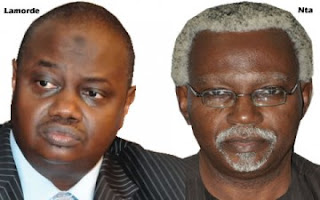Activists and legitimate professionals include depicted divergent viewpoints for the thought out merger involving government’s anti-graft businesses, the actual Fiscal and Fiscal Violations Fee along with the Unbiased Corrupt Methods and other associated Offences Fee.
The offered merger with the a couple of businesses can be said to have obtained the actual endorsement with the Federal Account manager Local authority or council and it's the main restructuring from the general public assistance.
The restructuring, as outlined by spokesman intended for Chief executive Goodluck Jonathan, Reuben Abati, might find 220 govt parastatals scrapped.
The joining with the EFCC along with the ICPC can be a part of referrals made by the actual Charlie Orosanye-led Presidential Panel on Rationalisation and Restructuring involving Federal Parastatals, Income and Organizations.
However, inside different interview with this correspondents on Friday, many well known legitimate professionals and municipal society groups differed inside their viewpoints in regards to the help you aren't involving a really merger.
Any senior citizen attorney at law, Prof. Itse Sagay, SAN; EFCC aide, Rotimi Jacobs, SAN, and Fundamental Godwin Obla; along with Malam Yusuf Ali, SAN, had been among the legitimate personalities of which depicted his or her thoughts in regards to the merger with the a couple of anti-corruption systems.
Sagay explained, “I was uncomfortable with the strategy. I do believe the two anti-graft businesses are needs to specialise. You will find there's tendency with the ICPC to travel after data corruption by general public officers.
“They have a very rigorous training programme that needs paramilitary recommendations.
“EFCC can be dwelling on both general public corruption and corruption from the private segment.
“If we merge these people, I think it may reduce the energy of the actual anti-corruption advertising campaign. I don’t think it may be beneficial. ”
Jacobs explained which the effect with the merger for the anti-corruption campaign is based on on the actual motive behind the blueprint.
“It is often a proposal; you can’t combine two businesses without changing regulations, ” he said.
Asked if the planned merger would improve anti-corruption advertising campaign, Jacobs explained, “Depending for the intention powering it. If it's well intended, it might strengthen the actual anti-corruption war, but when it is not properly intended, will probably be counterproductive. ”
Obla inside his contribution said, “They include different characteristics, how will you integrate these people? You have to return to the actual National Set up. ”
He also said that it becomes difficult to know very well what effect such a merger would have on the anti-graft war right now “because it could be the new law that could determine whether the actual anti-corruption war are going to be given a brand-new bite or whether will probably be weakened. It is best we wait for that new law. ”
In his part, Ali expressed self-assurance that merging the two bodies was the suitable step in the suitable direction in the combat corruption.
Ali explained, “The work with the EFCC and ICPC has been often proves to be overlapping and sometimes it would be very confusing.
“If you glance at the ICPC Act it offers more regarding corruption, EFCC has more regarding money laundering however their functions overlap. If the merger could lead to more efficiency, then it's welcome.
“If right from the beginning the two agencies are already joined in one body nobody would have complained about the idea. ”
The Campaign intended for Democracy said the actual proposal was “an verification by government which the two organisations cannot continue to exist under a replicated basis of functioning. ”
The Chief executive of CD, Doctor. Joe Okei-Odumakin, urged Nigerians to acknowledge the point that while the EFCC had during the past secured few much talked about convictions for data corruption charges, “there has been no major landmark conviction secured with the ICPC. ”
Your lover said, “This has recently become applicable to the EFCC. Be that as it could, the political will probably of any government is what exactly is really required from the fight against data corruption.
“While anticipating until this merger will even more strengthen the organization for fighting the actual menace of data corruption, the government must also go back and address the basic factors that can enhance an effective performance of anti-corruption systems.
“This really needs to be done by an appropriate review of the actual legislative framework with the organisation and the willingness with the government to help make the welfare with the anti-corruption operatives a highly regarded priority. This is a major impediment from the fight against data corruption in Nigeria.
“Nigeria must concentrate more on institutionalised anti-corruption campaign not with the name or volume of bodies saddled with the responsibilities alone, but utmost with the determination and political will with the nation’s leadership to fight corruption. ”
When contacted by among our correspondents, spokesman for that ICPC, Mr. Folu Olamiti, refused to discuss the development.
“No remarks, ” he told among our correspondents.
His counterpart from the EFCC, Mr. Wilson Uwujaren, said he was at the meeting and promised to call back but wouldn't do so up till some time of filing this particular report.

No comments:
Post a Comment